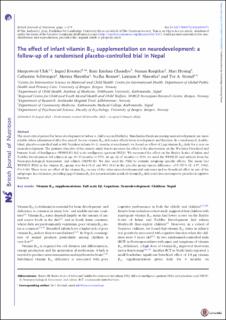| dc.contributor.author | Chandyo, Manjeswori Ulak | |
| dc.contributor.author | Kvestad, Ingrid | |
| dc.contributor.author | Chandyo, Ram Krishna | |
| dc.contributor.author | Ranjitkar, Suman | |
| dc.contributor.author | Hysing, Mari | |
| dc.contributor.author | Schwinger, Catherine | |
| dc.contributor.author | Shrestha, Merina | |
| dc.contributor.author | Basnet, Sudha | |
| dc.contributor.author | Shrestha, Laxman | |
| dc.contributor.author | Strand, Tor Arne | |
| dc.date.accessioned | 2022-10-06T06:52:16Z | |
| dc.date.available | 2022-10-06T06:52:16Z | |
| dc.date.created | 2022-05-06T07:04:55Z | |
| dc.date.issued | 2022 | |
| dc.identifier.citation | British Journal of Nutrition. 2022, 1-8. | en_US |
| dc.identifier.issn | 0007-1145 | |
| dc.identifier.uri | https://hdl.handle.net/11250/3024171 | |
| dc.description.abstract | The most critical period for brain development is before a child’s second birthday. Standardised tests measuring neurodevelopment are more reliable when administered after this period. Severe vitamin B12 deficiency affects brain development and function. In a randomised, double-blind, placebo-controlled trial in 600 Nepalese infants (6–11 months at enrolment), we found no effect of 2 µg vitamin B12 daily for a year on neurodevelopment. The primary objective of the current study was to measure the effect of the intervention on the Wechsler Preschool and Primary Scale of Intelligence (WPPSI-IV) full scale intelligence quotient (FSIQ). We measured the effect on the Bayley Scales of Infant and Toddler Development 3rd edition at age 30–35 months (n 555). At age 42–47 months (n 533), we used the WPPSI-IV and subtests from the Neuropsychological Assessment, 2nd edition (NEPSY-II). We also used the FSIQ to estimate subgroup specific effects. The mean (SD) WPPSI-IV FSIQ in the vitamin B12 group was 84·4 (8·4) and 85·0 (8·6) in the placebo group (mean difference −0·5 (95 % CI -1·97, 0·94), P = 0·48). There were no effect of the vitamin B12 on any of the other neurodevelopmental outcomes and no beneficial effect in any of the subgroups. In conclusion, providing 2 µg of vitamin B12 for a year in infants at risk of vitamin B12 deficiency does not improve preschool cognitive function. | en_US |
| dc.language.iso | eng | en_US |
| dc.rights | Navngivelse 4.0 Internasjonal | * |
| dc.rights.uri | http://creativecommons.org/licenses/by/4.0/deed.no | * |
| dc.title | The effect of infant vitamin B12 supplementation on neurodevelopment: A follow-up of a randomized placebo-controlled trial in Nepal. | en_US |
| dc.title.alternative | The effect of infant vitamin B12 supplementation on neurodevelopment: A follow-up of a randomized placebo-controlled trial in Nepal. | en_US |
| dc.type | Peer reviewed | en_US |
| dc.type | Journal article | en_US |
| dc.rights.holder | © The Author(s), 2022 | en_US |
| dc.description.version | publishedVersion | en_US |
| cristin.ispublished | true | |
| cristin.fulltext | original | |
| cristin.qualitycode | 2 | |
| dc.identifier.doi | 10.1017/S0007114522000071 | |
| dc.identifier.cristin | 2021951 | |
| dc.source.journal | British Journal of Nutrition | en_US |
| dc.source.pagenumber | 1-8 | en_US |

